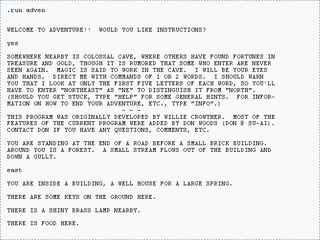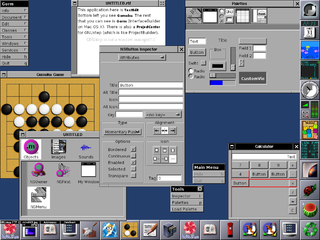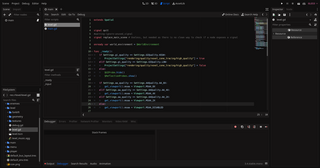The editor war is the rivalry between users of the Emacs and vi text editors. The rivalry has become an enduring part of hacker culture and the free software community.

Emacs Lisp is a dialect of the Lisp programming language used as a scripting language by Emacs. It is used for implementing most of the editing functionality built into Emacs, the remainder being written in C, as is the Lisp interpreter. Emacs Lisp is also termed Elisp, although there are also older, unrelated Lisp dialects with that name.

Interactive fiction, often abbreviated IF, is software simulating environments in which players use text commands to control characters and influence the environment. Works in this form can be understood as literary narratives, either in the form of interactive narratives or interactive narrations. These works can also be understood as a form of video game, either in the form of an adventure game or role-playing game. In common usage, the term refers to text adventures, a type of adventure game where the entire interface can be "text-only", however, graphic text adventures still fall under the text adventure category if the main way to interact with the game is by typing text. Some users of the term distinguish between interactive fiction, known as "Puzzle-free", that focuses on narrative, and "text adventures" that focus on puzzles.
An integrated development environment (IDE) is a software application that provides comprehensive facilities for software development. An IDE normally consists of at least a source-code editor, build automation tools, and a debugger. Some IDEs, such as IntelliJ IDEA, Eclipse and Lazarus contain the necessary compiler, interpreter or both; others, such as SharpDevelop, NetBeans do not.

XEmacs is a graphical- and console-based text editor which runs on almost any Unix-like operating system as well as Microsoft Windows. XEmacs is a fork, based on a version of GNU Emacs from the late 1980s. Any user can download, use, and modify XEmacs as free software available under the GNU General Public License version 2 or any later version.
The Z-machine is a virtual machine that was developed by Joel Berez and Marc Blank in 1979 and used by Infocom for its text adventure games. Infocom compiled game code to files containing Z-machine instructions and could therefore port its text adventures to a new platform simply by writing a Z-machine implementation for that platform. With the large number of incompatible home computer systems in use at the time, this was an important advantage over using native code or developing a compiler for each system.

GNUstep is a free software implementation of the Cocoa Objective-C frameworks, widget toolkit, and application development tools for Unix-like operating systems and Microsoft Windows. It is part of the GNU Project.

GNU TeXmacs is a scientific word processor and typesetting component of the GNU Project. It originated as a variant of GNU Emacs with TeX functionalities, though it shares no code with those programs, while using TeX fonts. It is written and maintained by Joris van der Hoeven and a group of developers. The program produces structured documents with a WYSIWYG user interface. New document styles can be created by the user. The editor provides high-quality typesetting algorithms and TeX and other fonts for publishing professional looking documents.

Gnus, or Gnus Network User Services, is a message reader which is part of GNU Emacs. It supports reading and composing both e-mail and news and can also act as an RSS reader, web processor, and directory browser for both local and remote filesystems.
Incompatible Timesharing System (ITS) is a time-sharing operating system developed principally by the MIT Artificial Intelligence Laboratory, with help from Project MAC. The name is the jocular complement of the MIT Compatible Time-Sharing System (CTSS).
This article provides basic comparisons for notable text editors. More feature details for text editors are available from the Category of text editor features and from the individual products' articles. This article may not be up-to-date or necessarily all-inclusive.
Hemlock is a free Emacs text editor for most POSIX-compliant Unix systems. It follows the tradition of the Lisp Machine editor ZWEI and the ITS/TOPS-20 implementation of Emacs, but differs from XEmacs or GNU Emacs, the most popular Emacs variants, in that it is written in Common Lisp rather than Emacs Lisp and C—although it borrows features from the later editors. Hemlock was originally written by the CMU Spice project in Spice Lisp for the PERQ computer.
Bernard S. Greenberg is a programmer and computer scientist, known for his work on Multics and the Lisp machine.
libffi is a foreign function interface library. It provides a C programming language interface for calling natively compiled functions given information about the target function at run time instead of compile time. It also implements the opposite functionality: libffi can produce a pointer to a function that can accept and decode any combination of arguments defined at run time.

GNU Emacs is a free software text editor. It was created by GNU Project founder Richard Stallman, based on the Emacs editor developed for Unix operating systems. GNU Emacs has been a central component of the GNU project and a flagship project of the free software movement. Its tag line is "the extensible self-documenting text editor."
Clozure CL (CCL) is a Common Lisp implementation. It implements the full ANSI Common Lisp standard with several extensions. It contains a command line development environment, an experimental integrated development environment (IDE) for Mac OS X using the Hemlock editor, and can also be used with SLIME. Clozure CL is open source and the project is hosted by Clozure Associates.
Emacs, originally named EMACS, is a family of text editors that are characterized by their extensibility. The manual for the most widely used variant, GNU Emacs, describes it as "the extensible, customizable, self-documenting, real-time display editor". Development of the first Emacs began in the mid-1970s, and work on GNU Emacs, directly descended from the original, is ongoing; its latest version is 29.1, released July 2023.

A scripting language or script language is a programming language that is used to manipulate, customize, and automate the facilities of an existing system. Scripting languages are usually interpreted at runtime rather than compiled.

Ronald Steven Schnell is an American computer programmer in Weston, Florida. He was co-founder of Mail Call in 1997 and the chief technology officer of Rand Paul's 2016 presidential campaign.








